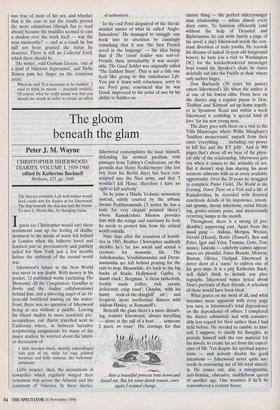Good soldiering on
P. J. Kavanagh
FORD MADOX FORD: A DUAL LIFE, VOLUME II by Max Saunders OUP, £35, pp. 696 Ford Madox Ford in his mid-fifties; his behaviour towards young women, observed by the cold eye of Malcolm Cowley:
They would be fondled by Ford, then escape him up the stairs. Ford, heavy and wheezing by that time, would follow them to the head of the narrow stairs, and the door would close in his face. He would wheeze back down, and a little while later he'd follow another young woman until she took refuge behind the locked door.
There is something unlikely in this tale of serial harassment — where was Cowley standing; behind a curtain? — nowhere else is such carrying-on reported of him, not in this exhaustive biography or in others — by MacShane or Judd — and even more unlikely because, if anything, Ford was the opposite of a pouncer; he was a serial monogamist, with results almost wholly disastrous to himself.
It is a story that makes you wrinkle your nose, but it is representative of the malice a compulsively generous Ford could provoke, especially from Americans he helped such as the ineffable Hemingway). Perhaps it was his tweedy 'English' persona, but that was only one of the masks he could con- sciously or unconsciously adopt; this account subtly analyses the way he was all novelist, in conversation as well as in writ- ing; he barely distinguished between the two. Like us all, but to a much greater extent, he was a self-invention, or a series of these.
The baleful anecdote allows Max Saun- ders to reveal his constant stance as a biog- rapher. He prints any adverse comment, but puts it in context:
If he seemed the comic lecher to Cowley, it may have been because he kept his deeper needs so private: the need to forget Cheatham, to find consolation.
In other words, to know all is to forgive all, and Ford does have that effect on his biog- raphers. Unsurprisingly: the Ford, fallen between the wheels of an advancing lorry, who was heard to murmur, 'Now is your chance, St Christopher', is irresistible.
Injuries of an emotional kind were not so easily averted. The 'Cheatham' mentioned by Saunders was a girl half Ford's age with whom he was greatly in love. They could not marry because he had married, early, a wife who would not divorce him; not to mention his long relationship with a socialite Fury called Violet Hunt who pur- sued him down the nights and down the days, a long cohabitation with the under- standing Australian painter Stella Bowen. by whom he had a daughter (he supported them both, from resources that grew ever more slender), and another more recent entanglement from which he had barely extricated himself — and so on . . . .
None of these confusions would matter, or would be worth recording so carefully in this absorbing book, were they not the self- inflicted wounds of one of the best and most entertaining writers of this century: tirelessly editing and encouraging younger writers — D. H. Lawrence, Ezra Pound, Graham Greene, the list is long — while every day composing the thousand words that kept (barely) the creaking edifice afloat, and sometimes these words added up to impressionistic masterpieces, like the Tietjens tetralogy, Parade's End.
Someone remarked that Ford seemed able to stay in love for five years, and drag the relationship on for a further five, and no more. Rebecca West replied that this was true of most of his sex, and whether that is the case or not the results proved the more calamitous (though fun to read about) because the muddles seemed to cast a shadow over the work itself — was the man trustworthy? — and as a result he has still not been granted the status he deserves. There is still no Collected Ford, which there should be.
`He writes', said Graham Greene, 'out of a kind of hilarious depression', and Stella Bowen puts her finger on the conscious artist:
When he said 'It is necessary to be truthful', I used to think he meant — precisely truthful. Of course, what he really meant was that you should use words in order to create an effect of authenticity.
In the end Ford despaired of the literal- minded nature of what he called 'Anglo- Saxondom'. He managed to smuggle one book into its attention by cunningly remarking that it was 'the best French novel in the language' — the idea being that if The Good Soldier was sort-of- French, then, presumably, it was accept- able. The Good Soldier was originally called `The Saddest Story'. That is not a title one feels like giving to this tumultuous Life. You put it down with reluctance, sorry to see Ford gone, convinced that he was Good, impressed to the point of awe by his ability to Soldier on.



















































































 Previous page
Previous page